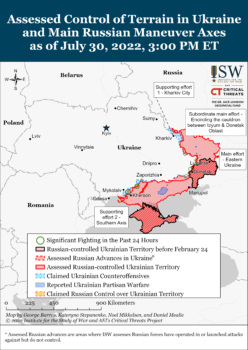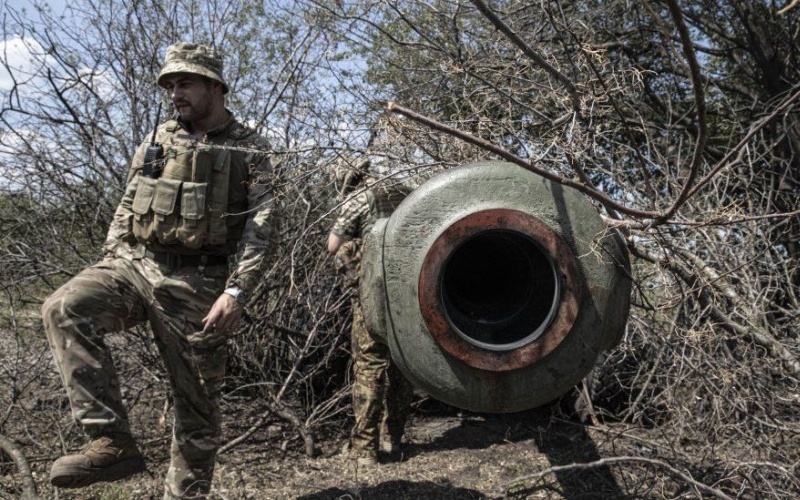Ukrianian troops and artillery on the frontline in the Kherson region in southern Ukraine, July 2022 (Getty)
Jump to Original Entry
EA on ANews: Ukraine’s 1st Grain Export from Black Sea Ports — What Is The Significance?
Thursday’s Coverage: Russia — Remove Sanctions or We Cut Gas

Source: Institute for the Study of War
UPDATE 0904 GMT:
US Secretary of State Antony Blinken says Washington will take up Russian Foreign Minister Sergey Lavrov signal of discussion of prisoner swaps, following the 9-year prison sentence imposed on US basketball star Brittney Griner by a Moscow court.
Blinken told reporters on the sidelines of an ASEAN Foreign Ministers’ meeting in Cambodia:
We put forward, as you know, a substantial proposal that Russia should engage with us on. And what Foreign Minister Lavrov said this morning and said publicly is that they are prepared to engage through channels we’ve established to do just that. And we’ll be pursuing that.
Lavrov said earlier on Friday that Russia is ready to discuss a high-profile prisoner swap with the US through a diplomatic channel agreed by US President Joe Biden and Russian President Vladimir Putin.
Before Griner’s conviction, the Biden Administration offered to swap arms dealer Viktor Bout, who is serving a 25-year sentence, for the basketball star and security official Paul Whelan.
UPDATE 0728 GMT:
Three more ships, with a total of about 58,000 tons of Ukrainian corn, have left Black Sea ports.
Two of the ships set off from Chornomorsk and the other from nearby Odesa.
The Panama-flagged Navistar, with 33,000 tons of corn, is bound for Ireland. The Malta-flagged Rojen, with 13,000 tons, is destined for the UK. The Turkey-flagged ship Polarnet, with 12,000 tons, is heading for the Turkish Black Sea port of Karasu.
The first ship to sail after the lifting of the Russian blockade, the Sierra Leone-flagged Razoni, cleared inspection in Turkey on Thursday and is en route to Lebanon.
Ukraine Infrastructure Minister Oleksandr Kubrakov wrote, “Our goal is three million more tonnes of agricultural export every month….The sooner we can export 20 million tonnes of last year’s crop and start exporting new ones, the sooner the world’s food situation will improve.”
Three more 🛳 Navi star, Rojen & Polarnet left 🇺🇦 ports. Our main goal is to increase the transshipment volume in our ports. We have to provide the processing of 100🛳 per month to be able to export the necessary amount of foodstuffs. pic.twitter.com/6QQyTWlsSX
— Oleksandr Kubrakov (@OlKubrakov) August 5, 2022
UPDATE 0708 GMT:
Amnesty Ukraine has challenged its parent organization Amnesty International over a report about the Ukrainian military and civilian areas.
On Thursday, Amnesty International said the Ukrainian military had established bases and weapons systems in residential areas, including in schools and hospitals.
While emphasizing that many Russian assaults were “war crimes” on civilian sites where there was no military presence, Amnesty International’s head Agnes Callamard said, “Being in a defensive position does not exempt the Ukrainian military from respecting international humanitarian law.”
Amnesty Ukraine responded on Facebook that it was denied any input into the report. Despite repeated appeals, it was not sent any material in advance of publication. No response from the Ukraine Defense Ministry was included.
Every person from the Ukrainian Amnesty office knows that the Russian Federation is responsible for the crimes of aggression against Ukraine. Moreover, a large part of our team are people who personally had to save themselves and loved ones from the war with Russia, leaving everything behind. Some of us have already been displaced or refugees twice.
President Volodymyr Zelenskiy amplified on Thursday night that Amnesty International had sought to offer “amnesty [to] the terrorist state and shift the responsibility from the aggressor to the victim”.
There is no condition, even hypothetically, under which any Russian strike on Ukraine becomes justified. Aggression against our state is unprovoked, invasive and terrorist.
If someone makes a report in which the victim and the aggressor are supposedly equal in some way…then this cannot be tolerated.
UPDATE 0700 GMT:
Relatives of Ukrainian prisoners of war gathered in central Kyiv on Thursday, following the killing of about 53 POWs in an explosion in a prison in the Russian proxy area of eastern Ukraine last Friday.
The family members called for information, with the Red Cross still not granted permission by Russian proxy officials to examine the site or meet wounded POWs.

Photo: Reuters
ORIGINAL ENTRY: In its latest assessment of the Russian invasion, the US-based Institute for the Study of War concludes that Ukraine is “actively shaping the course of the war for the first time”.
The ISW, with its detailed coverage of the conflict on the ground, bases its judgement on Russia’s mass movement of forces from eastern Ukraine — where it is seizing to seize more territory — to the south, facing a Ukrainian counter-offensive.
Over the past month, the Ukrainians have reclaimed villages in the Kherson region, occupied by Russia in the opening days of the February 24 invasion. Using recently-supplied US-made HIMARS medium-range rockets systems, they have destroyed or damaged scores of Russian logistical positions, ammunition dumps, and bridges.
See also Ukraine War, Day 156: Ukrainian Forces Attack Near Russian-Occupied Kherson
The ISW writes:
Ukraine is likely seizing the strategic initiative and forcing Russia to reallocate forces and reprioritize efforts in response to Ukrainian counteroffensive operations.
Russian forces are increasingly transferring personnel and equipment to Kherson and western Zaporizhzhia Oblasts [in southern Ukraine] at the expense of their efforts to seize Slovyansk and Siversk [in the east], which they appear to have abandoned.
Russian forces are also redeploying military equipment – artillery and aviation in particular – to Crimea from elsewhere in Ukraine.
A Russian failure to seize all of the Donetsk region, after occupying neighboring Luhansk, would be a further setback to Vladimir Putin’s objectives. The initial phase of the invasion could not enter the capital Kyiv and topple the Zelenskiy Government, and Russian forces withdrew from northern Ukraine at the end of March.
Putin then held up the “liberation” of the Donbas, comprised of Donetsk and Luhansk, as the goal for his forces.
But the Russians have spent much of their force, losing about 1/3 of the initial combat effectiveness, and now face a Ukrainian fightback in the south after Kyiv received advanced armor, weapons, and equipment from the international community.
Ukrainian officials are still cautious about the situation. President Volodymyr Zelenskiy told the nation that troops in the east are still in “hell” as they resist the Russians.
Gen. Oleksiy Hromov said Ukraine has retaken two villages near the city of Slovyansk. However, he said forces have pulled back from a coal mine near Avdiivka.
Russia claimed that it had moved into the village of Pisky, about 10 km (6 miles) northwest of Russian-occupied Donetsk city.
Hromov also warned that Russia, having moved forces to the south, may attempt its own offensive to push back Ukraine’s advance.
Still, the ISW cited Ukrainian capture of territory in the east, gaining ground southwest of Izyum and northwest of Slovyansk: “If Ukraine is able to press hard around Izyum as it continues rolling into the counteroffensive in Kherson, then Russian forces will begin confronting very difficult choices.”
The Ukraine military said that on Thursday a pair of helicopters “destroyed an enemy stronghold in the occupied part of the Mykolaiv Oblast, and that the strikes demolished three ammunition and equipment depots, several S-300 anti-aircraft systems, a radar station, and nine armoured vehicles.

